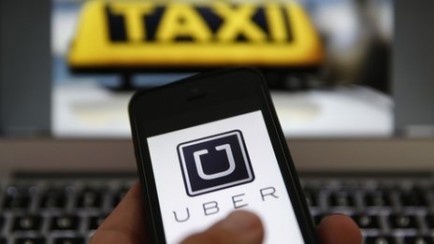
The Uber ‘taxi’ app has faced stern opposition from taxi drivers in Spain
A judge in Spain has ruled that online car sharing app Uber is to immediately cease its operations across the country following a string of protests from taxi associations…
Uber – devised as a startup in the US a couple of years ago that allows people to order a ‘lift’ from car owners who live nearby – has faced wave after wave of protests in nearly all countries in which it has been launched.
The premise is relatively simple, but has had taxi associations up in arms claiming that Uber creates an unfair playing field.
The Spanish judge has ruled that because Uber drivers do not have official authorisation to use their car as a fee-paying service, the app was creating “unfair competition” for taxi firms.
The Madrid Taxi Association first brought a complaint before the courts earlier this year after hundreds of city taxi drivers made their feelings known.
The chief grievance is that Uber drivers only have to sign up to the service, pass a quick background and car check (a short examination to test that the vehicle the Uber member drives is not less than five years old and in roadworthy condition) and then give a small percentage of their ‘fares’ to Uber.
Traditional taxi firms argue that the service is in direct competition to theirs but, crucially, Uber drivers are exempt from paying the often-hefty tax regulations that traditional taxi drivers are subject to.
Uber has long countered this claim in numerous countries around the world, stating that theirs is a ride-sharing service, not a taxi service, and fare rates are worked out between the rider and the driver at point of interaction online.
From a user’s perspective, Uber appears to have won over millions with its slick marketing, easy-to-use mobile phone app and evidently reliable and affordable service.
Nevertheless, the Spanish judge, in banning the app’s service in Spain, said: “Uber drivers lack the administrative authorisation to carry out the job, and the activity they carry out constitutes unfair competition.”
Uber has not yet confirmed whether it is going to appeal the ruling, or whether it will simply allow the potentially lucrative Spanish market to slip through its fingers. Currently the company is valued at more than $17 billion – nice going for a Californian startup that began life in 2009.
In India this week, Uber was banned followed a rape allegation levelled at one of its drivers. The company has courted controversy in the US, UK and other European countries, and has recently been banned in Thailand too, but its meteoric rise does seem to suggest that the app is tapping into a market that was hitherto neglected.
Uber was first launched in Spain in Barcelona in April, with the service quickly rolled out to Madrid and Valencia in October. A future court case will determine whether Uber has any chance of re-entering the Spanish market.
 en
en



 Vlaams-Nederlands
Vlaams-Nederlands
0 Comments
Leave a Comment
DISCLAIMER
The opinions and comments expressed by contributors to this Blog are theirs alone and do not necessarily reflect the views of VIVA Homes Under the Sun Ltd, any of its associated companies, or employees; nor is VIVA to be held responsible or accountable for the accuracy of any of the information supplied.
Have you got something to say?